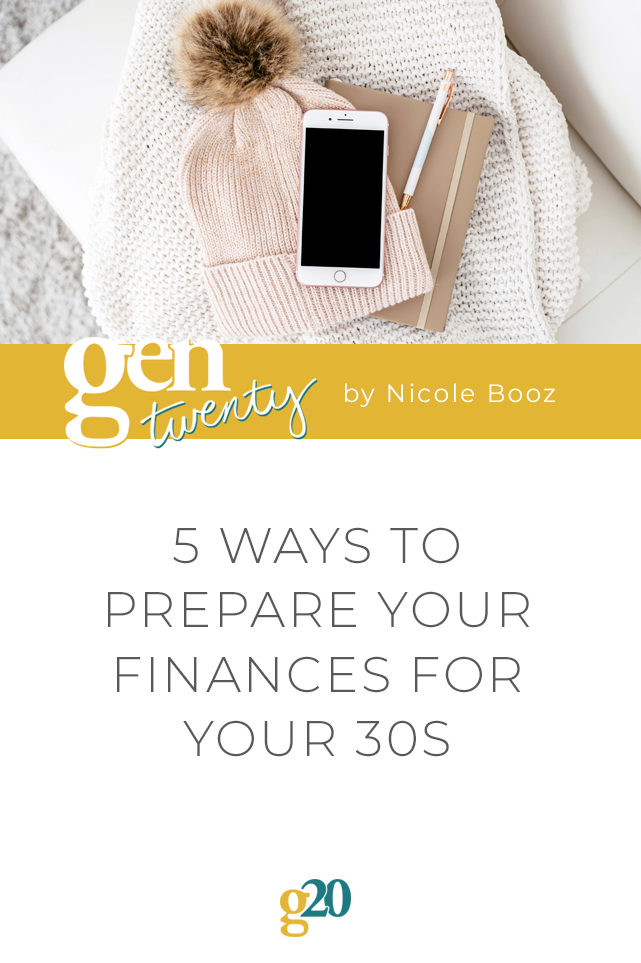This post is sponsored by Lexington Law.

I’ve heard that as one ages into their thirties, they tend to find this inner self-confidence and self-acceptance that seemed elusive in one’s twenties. I’m not quite sure because I’m still on the cusp of that decade transition, but I have an inkling that something about that assertion will ring true for me as well.
As my 30th birthday is approaching next year and we’re ending a decade as I’m writing this, I’ve been thinking a lot about how my thirties will look and feel differently from my twenties, especially financially. I don’t personally believe we should throw caution to the wind and assume we will figure everything out later. I’m a prepare-for-the-worst type of person with a very goal-oriented personality.
Part of moving into my thirties means my financial goals are changing (like how much it’s going to cost to have a second child or buy a house, for example). While I’ve built a lot of great financial habits in my twenties, I want to make sure we both, dear reader, are financially prepared for our thirties.
With that said, here are five ways to prepare your finances for your 30s. Some I have finished and others I am still working on myself!
5 Ways To Prepare Your Finances For Your 30s
1. Set financial goals.
At the end of every year I sit down and make new financial goals for myself. It’s something I quite enjoy doing, actually. It’s interesting to me to see what I spent money on during the past year and what I want to spend money on in the upcoming year.
Instead of just planning for my next year, now though, I’ll be loosely sketching out financial goals I have for my thirties. Some of them so far include:
- Put 20% down on a house
- Saving $$$$ to buy furniture for said house
- Start a savings account for a second child
- Max out my retirement accounts every year of my thirties
These are some overarching financial goals for my thirties. If I don’t know how I want to spend my money, how can I direct it appropriately? Making a list of financial goals helps me focus my saving and spending and keep my on track.

2. Fill your emergency fund.
According to Lexington Law, nearly 3 in 5 Americans have less than $5,000 in savings. That means that if an extra bill comes up or a source of income is lost, many will struggle to cover their bills and expenses.
If your emergency fund in your twenties was basically non-existent, let’s make it a goal to leave that instability behind. One step to creating financial security is being able to cover your expenses in an emergency. It’s your first line of defense if things go wrong.
[Tweet “Your emergency fund is your first line of defense when things go wrong.”]
I’ve had to dip into my emergency fund a couple of time, including a last-minute cross-country flight for a family emergency. I was still in the thick of paying off my student loans and credit card debt. If I hadn’t also been contributing to my emergency fund during that time, I would have had to dip into an emergency line of credit to cover the $450 in airfare and $500 in additional hotel and food expenses. It was a relief to know that in a time of such emotional stress that I could financially cover the emergency.
I have a complete guide to creating your emergency fund right here. It answers questions like how much to save, how to save that money, and six other non-monetary things I consider to be part of your emergency fund.
3. Find a budgeting method that works for you.
Budgeting is about understanding the flow of your money. Know what’s coming in, what’s going out, what you’re spending it on, and what you’re saving.
In our twenties, a lot of us have made significant financial moves already. Whether it’s moving into your own apartment, buying a house, having a child, buying a car, or something else — these things have taken financial planning on some level. Budgeting is just making sure that your monthly finances are planned out and working efficiently to help you reach your overall financial goals.
Related: How To Budget To Improve Your Credit
Some people love budgeting, and other others hate it. Thankfully, there are many methods to effectively managing your money that makes sense differently for different people with different lifestyles.
[Tweet “5 Ways To Prepare Your Finances For Your 30s”]

Here are a few budgeting resources for you to explore and learn more about:
- Personal Capital Review
- 5 Ways The Mint App Has Helped Me Step Up My Budget
- How to Create a Budget That Works With Your Spending Habits
- Adulting and Money: How To Manage Your First Salary and Benefits
- How To Reach All of Your Financial Goals Without a Budget
4. Open a “treat yourself” savings account.
I have been saving $100 a month in my “treat yourself” savings account for over three years now. I’ve been setting this money aside for when the day comes that I find something I really want to enjoy.
A couple of months back, I saw a Gucci backpack that I thought was absolutely gorgeous. I purchased it for myself using my “treat yourself” fund. And as it turns out, I absolutely love it and have no regrets over purchasing it. I use it as often as I can and didn’t have to break my budget to buy it.
Even if you add $20 per month to a treat yourself fund, that money will really add up over time. And then when you find something you do really want, you can purchase it without feeling guilty.
5. Improve your credit score.
Our world moves on credit. And credit can be confusing and scary but because it’s so important, it’s necessary to educate yourself on it.
Related: Financial Literacy Month: How Your Credit Impacts Your Life
Your credit score is what lenders use to understand your trustworthiness as a borrower. Things like buying a house or a car often require us to take out a mortgage or an auto loan.
Your credit score helps determine how much you can borrow but also the interest rate on the amount you’re borrowing. Interest rates can make a huge impact on the total amount you will owe by the end of your loan term. Higher interest rates mean you’re paying more simply to borrow the money than a lower interest rate does.
Related: Credit Repair: Why It Matters With Lexington Law
Lexington Law has a fantastic blog post here with a wealth of information on how different loans and interest rates can impact your finances. It is worth the read to better understand how your credit impacts your interest rates long-term.
To improve your credit score, you first need to know two things. One being what your credit score is. And two, you need to know what is on your credit report. If you haven’t taken at look at your credit report in a while, here is how to do it (with three ways to check your credit score for free, too).
When you look at your credit report, look for any errors, unfair or unsubstantiated information. If there is something you don’t recognize, that is a huge red flag that something like identity theft might be happening.
If you do see something like that, credit repair is an important step in achieving financial freedom. With unfair negative items on your credit report, it’s likely that you’re being held back from achieving your financial goals.
Take the first step to credit repair and schedule a free consultation with the credit repair consultants at Lexington Law.

Taking steps to prepare your finances for your 30s is a smart move to make. You are laying the groundwork for financial success and financial confidence in the future.
What steps are you taking for your 30s? I’d love to hear about them in the comments!
